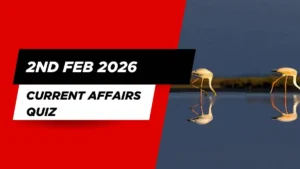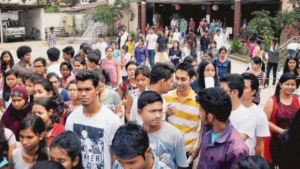Dear Students, SBI PO exam will be a challenge given the difficulty level of English Section. SBI introduced New Pattern English Question based on the CAT exam last year this year we can expect more new type of questions, So we are providing new pattern quizzes that will help you understand the new pattern.
Directions (1-15): Five alternative summaries are given below the text. Choose the option that best captures the essence of the text.
Q1. Laljipada’s residents are largely entrepreneurs running cottage industries from their homes that are as small as 100 square feet. Primarily migrants from North India, they contradict the popular perception that migrants take away jobs from the local population. The 20,000 families here are self-employed; they make products that feed into larger businesses such as imitation jewelry, recycled plastic and paper waste, or operate small tailoring or bakery units. With each family contributing in some way or the other to the final finished product, all the families here are dependent on each other for their livelihood.
(a) Laljipada’s residents run cottage industries from their homes contributing to other finished products and are interdependent on each other for livelihood.
(b) The 20,000 families of Laljipada depend on each other for their livelihood as each family runs some cottage industry producing parts for some other products.
(c) Laljipada’s 20,000 families have a well-knit system of cottage industries each one dependent on the other for its livelihood.
(d) Laljipada’s 20,000 families are a well-knit system of north Indian entrepreneurs dependent on each other without taking away the jobs from the locals.
(e) Laljipada’s 20,000 families are a well-knit system of entrepreneurs making products that feed into larger businesses and each dependent on the other for its livelihood.
Q2. Russia and the United States have signed a new strategic nuclear-arms reduction treaty. Officially, the treaty cuts their weapons by one-third; in fact, each party, will decommission only several dozens. Nevertheless, the treaty is a considerable achievement. It normalizes political relations between the two countries, thereby facilitating their further cooperation and rapprochement.
(a) The new strategic arms reduction treaty signed between Russia and the United States may facilitate further cooperation between them.
(b) The new strategic arms reduction treaty signed between Russia and the United States may lead to cordial relations between them.
(c) Russia and the United States have signed a strategic nuclear-arms reduction treaty to reduce weapons by one-third.
(d) Russia and the United States have signed a new strategic nuclear-arms reduction treaty which normalizes political relations between the two countries.
(e) Russia and the United States have signed a new strategic nuclear-arms reduction treaty is a considerable achievement.
Q3. A severe food crisis currently threatens southern Sudan. In East Africa, where millions of people already are dependent on food aid, a sharp rise in the cost of staple crops looms. These are just the latest sources of concern in a turbulent period that began two years ago when food shortages hit many countries in Africa and Asia due to a worldwide spike in prices. Higher food prices meant that poor people, already struggling to meet basic human needs, were pushed deeper into poverty.
(a) An impending food crisis looms over southern Sudan where higher food prices have pushed people deeper into poverty.
(b) The food crisis in Africa and Asia, especially in southern Sudan already struggling under food shortages, higher prices, and poverty may worsen owing to further a rise in the cost of staple crops.
(c) As many countries in Africa and Asia are experiencing prolonged food shortages, an impending food crisis threatens Sudan due to a rise in the cost of staple crops.
(d) The food crisis in Africa and Asia already struggling under food shortages, higher prices, and poverty may worsen owing to further a rise in the cost of staple crops.
(e) The food crisis in southern Sudan struggling under food shortages, higher prices, and poverty may worsen owing to further a rise in the cost of staple crops.
Q4. For millennia, remembering information was costly and time-consuming, and to forget was a natural part of being human. In the digital age, the opposite is true: cheap computer storage, powerful processors, and ubiquitous Internet access have made remembering the norm. Consider this: we tend to retain our rough drafts, years of e-mail traffic, and thousands of ghastly digital snapshots on our hard drives, not because we have decided that they are worth remembering, but because keeping them is now the default way of doing things. By contrast, deciding what to delete is costly. It actually requires much more time and effort to shed data than to keep it.
(a) Since the digital age has made retaining information cheap and effortless, we have left behind our natural habit of forgetting.
(b) Since the digital age has made storage of data cheap and easy, we now store large amounts of information even it is worthless.
(c) Remembering is no more costly and time consuming in the digital age; hence, we store large amounts of worthless information.
(d) The digital age has made it possible to retain large amounts of data cheaply and easily; hence we remember more unlike in the past.
(e) As deciding what to delete is costly and time consuming we now tend to store everything from rough drafts to ghastly images.
Q5. In recent decades, economists have been struggling to make use of the concept of human capital, often defined as the abilities, skills, knowledge, and dispositions that make for economic success. Yet those who use the term often assume that to conceptualize a phenomenon is a first step to manipulating it. And, indeed, “human-capital policy” is now much in fashion. But what if many of the abilities and dispositions in question are a product of history, capable of being understood and explained but not readily replicated?
(a) Economists trying to conceptualize human capital must know that the abilities and dispositions are a product of history incapable of being replicated.
(b) Economists trying to conceptualize human-capital policy for economic success must know history and that success cannot be replicated.
(c) The abilities, skills, knowledge, and dispositions that make for economic success are a product of history and may not be replicable.
(d) Economists attempting a policy based on human capital for economic success must know that the abilities referred to as human capital may not be readily replicable.
(e) Economists struggling to replicate economic success through a human-capital policy must know that human capital is a product of history and may only be understood.
Q6. An individual is free and autonomous only because of the collective decisions taken after democratic debate, notably those decisions that guarantee each person access to public goods such as education, health care, etc. Some sense of social solidarity may remain, but it is so abstract that those for whom the wheel of fortune has spun so favourably feel little debt. They believe that they owe their status purely to merit, not to the collective efforts-state-funded schools, universities, etc. – that enabled them to realize their potential.
(a) Individual success and autonomy are a result of the ability to exploit the system put together through collective efforts with a sense of social solidarity.
(b) The decisions that guarantee each person access to public goods are collective in nature, and individual merit is a myth.
(c) Individuals owe their success and autonomy to collective decisions and efforts that guarantee access to public goods like schools and universities.
(d) Individual success and autonomy are a result of the systems made through collective efforts that guarantee each person access to these systems.
(e) Individuals are free and autonomous only as far as they realize that they owe their success to collective decisions made with a sense of social solidarity.
Q7. Throughout history, political leaders have supported existing communication technologies in order to defend the system in which they rule. Today, too, governments may be tempted to protect newspapers and public TV on the pretext of “saving democracy as we know it.” But efforts to block technological change have been futile in the past, and they would be unwise today. Instead, the political system and the media must adapt to the new reality – the internet.
(a) Instead of trying to protect newspapers and public TV by blocking the internet, political leaders, and governments must adapt to the new reality.
(b) As they have failed in the past, political leaders and government would fail to block the internet by promoting the newspapers and public TV.
(c) Political leaders and governments have consistently failed in their efforts to block new technologies by supporting the existing ones.
(d) By supporting the newspapers and the public TV politicians and governments are trying to protect the existing media under the pretext of saving democracy.
(e) The efforts by governments and politicians to save the existing communication technologies have always proved futile; instead they must adapt to the new reality, today, the internet.
Q8. The financial and economic crisis that erupted in 2008 will, in retrospect, be regarded as a transformative moment, because it raised fundamental questions about the future shape of our economic systems. These questions are not so much about the end of capitalism-as some perceive or even desire-but rather about the different ways in which capitalism is understood in different countries.
(a) In retrospect, the economic crisis of 2008 raised fundamental questions about the future of capitalism working in different countries.
(b) In retrospect, the crisis that erupted in 2008 was not about the failure of capitalism as some see it, but about the differences between countries.
(c) In retrospect, the economic crisis of 2008 was not about the end of capitalism, but about how capitalism is understood in different countries.
(d) In retrospect, the crisis that erupted in 2008 was not fundamentally about the end of capitalism but about the future of capitalism in different countries.
(e) The economic crisis of 2008 did not signal the end of capitalism of its future but how it is understood in different countries.
Q9. Newspapers are dying; the music industry is still yelping about iTunes; book publishers think they are next. Yet one bit of old media seems to be doing rather well. In the final quarter of 2009 the average American spent almost 37 hours a week watching television. Earlier this year 116 m of them saw the Super Bowl-a record for a single programme. Far from being cowed by new media, TV is colonising it. Shows like “American Idol” and “Britain’s Got Talent” draw huge audiences partly because people are constantly messaging and tweeting about them, and discussing them on Facebook.
(a) Though newspapers, the music, and publishing industries are dying, American TV has been able to draw large audiences and being discussed on the internet.
(b) Though newspapers, the music and publishing industries are dying, American TV is colonizing the media with the average American spending 37 hours per week watching television.
(c) Though newspapers, the music, and publishing industries are dying, TV is colonizing the media and has huge audiences.
(d) Newspapers, music industry, and book publishers have been cowed by the new media whereas TV has coped well and still draws large audiences, as American TV proves.
(e) Newspapers, music, and book publishers have not been able to cope with the emergence of new media but American TV has coped well and still draws large audiences.
Q10. The tragedy about data collection in India is that by the time primary data is converted into useable information, it may be too late to aid policy intervention. This is true of data collected by not just government agencies such as the National Sample Survey Organization but also think-tanks such as National Council for Applied Economic Research (NCAER). One of the criticisms of Human Development in India: Challenges for a Society in Transition-a report put together by NCAER and Institute of Maryland, US-is that it is based on data collected in 2004-05, and it does not capture the impact of the changes of the past four years when the economy grew at more than 8% on an average every year.
(a) Data collected by government agencies and other research organizations in India is generally useless as no reports based on the primary data is available for years-NCAER report on human development report is an example.
(b) The problem with data collection in India is that reports based on the data are not available in time for use-an NCAER report based on 2004-05 data was released four years later.
(c) The data collection in India is generally useless because reports to guide policy decisions are not made in time-an NCAER report based on 2004-05 data was released four years later.
(d) Data collected by government agencies and other research organizations in India is generally useless; an NCAER report on human development report was released four years after the data was gathered.
(e) Data collected by government agencies and other research organizations in India is generally delayed and do not guide policy decisions-NCAER is an example.
Q11. Equating war with individual evil has become ubiquitous-if not universal-in contemporary to international politics. Wars are fights against evil tyrants and the illegitimate governments they control. Such rhetoric makes wars easier to justify, easier to wage, and easier to support, especially for elected leaders who must respond directly to swings in public opinion. Such language works equally well for any society in today’s media-obsessed age.
(a) In international politics wars are equated with individuals and not governments because it is easier for elected governments to justify war and publicize it.
(b) In international politics, wars are now directed at a personification of evil rather than against tyrants or regimes and are justified by governments in response to public opinion.
(c) In international politics, wars are equated with individual evil and not illegitimate governments because it is easier for elected governments to justify war and propagate it.
(d) In international politics, wars are now justified, waged and supported by elected governments to swing public opinion in a media-obsessed world.
(e) In the media obsessed current age wars are fought in order swing public opinion rather than against evil tyrants or illegitimate governments.
Q12. The CEOs owe at least some of their success to others, given that the society provides public goods like universities and health care. This calls for more modesty and restraint in determining the highest salaries, not for moral reasons but for the sustainability of the system. Also, the most privileged classes which have benefited the most from the solidarity of others, notably the poor, can no longer deny the latter’s contributions.
(a) As both the CEOs and the poor are products of the same system, these two classes need to acknowledge the system for its sustainability.
(b) The CEOs have a moral responsibly to exercise restraint in their highest salaries and the poor must acknowledge the contribution of the CEOs.
(c) For the sustainability of the system the CEOs need to be modest in their highest salaries, and the poor need to acknowledge the contribution of the CEOs towards their welfare.
(d) The CEOs must reduce their highest salaries and the poor must acknowledge the contribution of the CEOs for the sustainability of the system.
(e) The CEOs must acknowledge the role of public goods in their success and the poor must recognize the contribution of the CEOs for their welfare.
Q13. After reading literature by some of the world’s leading experts on innovation-Clayton Christensen, Henry Chesbrough, John Kao, James Andrew, and Harold Sirkin-I was fascinated, but, alas, also frustrated. Innovation is the production of new knowledge that generates value. It is about fresh ideas that give rise to novel products, services, and processes, new management methods, and original designs and inventions that generate greater profits for firms, regions and countries. These are great ideas, but as I went through these texts I found them to be rather familiar sounding-I had the feeling that somehow and somewhere I had already studied them.
(a) The writer after reading several experts on innovation felt disappointed as the experts themselves were merely repeating what the writer already knew.
(b) Though the writer was fascinated by what several experts in the field had to say on innovation, he felt disappointed that the experts had nothing new to say.
(c) Reading the experts on innovation, the writer was fascinated by their great ideas but felt discouraged that those experts were repeating what he already knew.
(d) After reading the world’s best writers on innovation, though I felt fascinated by their great ideas but found nothing new in them.
(e) Innovation is about fresh ideas. I found the world’s leading experts on innovation lacking in innovation in their works.
Q14. Once a plausible hypothesis is formulated, it must be tested against all existing theories and against all available experience and information. It has to be subject to open criticism from all directions, and only if it survives these tests and criticisms may it be adopted as tentative and conjectural new knowledge. Science and knowledge are made up not of winners, but of survivors of continuous and systematic efforts to refute. Theories are never certain and must always be prepared for an uncertain future.
(a) Science and knowledge have an uncertain future as these are hypotheses that have survived the systematic efforts to refute them.
(b) Science and knowledge are made up not of winners, but of survivors that must be prepared for an uncertain future.
(c) Conjectural new knowledge is that which is subject to criticism from all directions, but have survived the efforts to refute.
(d) Science and knowledge are not made up of definitive truths but of hypotheses that have survived the systematic efforts to disprove them.
(e) Science formulates plausible hypotheses, tests them against existing theories and they are adopted as conjectural new knowledge later.
Q15. When the next full-scale global financial crisis hits, let it not be said that the International Monetary Fund never took a stab at forestalling it. Recently, the IMF proposed a new global tax on financial institutions loosely in proportion to their size, as well as a tax on banks’ profits and bonuses.
(a) The IMF has proposed a new global tax on financial institutions and banks in an attempt to forestall future financial crises.
(b) The IMF’s new global tax on financial institutions and banks will prevent future financial crises.
(c) The IMF has proposed a new global tax on financial institutions and banks which will forestall financial crises.
(d) The IMF has proposed a tax on financial institutions’ and banks’ profits’ and bonuses that will prevent financial crises.
(e) The proposed tax on profits and bonuses of financial institutions and banks is an attempt to forestall future financial crises.
CRACK SBI PO 2017
89% of selected students in SBI PO last year, were students of BankersAdda Online Test Series.
More than 530 selections in SBI PO from CP Classroom Programs.




 Daily Current Affairs Quiz 2nd February,...
Daily Current Affairs Quiz 2nd February,...
 IBPS RRB Clerk Mains Memory Based Paper ...
IBPS RRB Clerk Mains Memory Based Paper ...
 IBPS RRB Clerk Mains Exam Analysis 2026,...
IBPS RRB Clerk Mains Exam Analysis 2026,...









